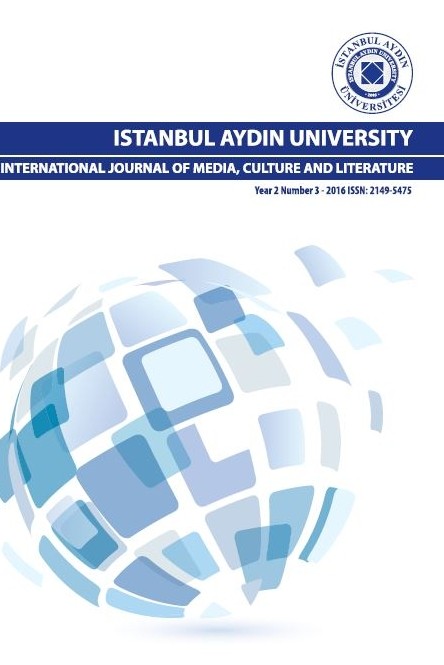The Critical Outlook to Eleni Sikelianos’ Body Clock: Poems with the Theoretical Backgrounds from Theorists Julia Kristeva and Susanna Egan
The Critical Outlook to Eleni Sikelianos’ Body Clock: Poems with the Theoretical Backgrounds from Theorists Julia Kristeva and Susanna Egan
This paper analyzes Body Clock: Poems in the perspective of Julia Kristeva’s Desire in Language A Semiotic Approach to Literature and Art and. It explicitly sheds light on Eleni Sikelianos’s poems in Body Clock with two different theorists such as Kristeva and Egan. Eleni Sikelianos’ (1965- ) both visual and verbal narrative style attribute an authentic outlook for readers, and they see the power of her performative style. The process of giving birth is narrated so creatively that when people read her poems, they will understand how life is a meaningful thing. The study will start with the life of Eleni Sikelianos, who is the author of Body Clock which reveals the idea of birth, womanhood, imaginative mind, and so on. Secondly, Body Clock is explained with its main concepts such as time, biology, motherhood including the growth of body and birth, and her drawings. The third part of the study will examine the poems of Body Clock from the perspective of Julia Kristeva’s Desire in Language: A Semiotic Approach to Literature and Art. This analysis will concern four theoretical backgrounds: “the speaking/split subject,” “semiotic chora & symbolic device,” “maternal body/ drive,” and “poetic language/carnivalesque.” In the fourth section of the paper, Body Clock is analyzed in terms of three concepts such as the mirror conception, body status and language in control of meaning in Mirror Talk: Genres of Crisis in Contemporary Autobiography written by Susanna Egan.
Keywords:
Julia Kristeva, the speaking subject, split subject, semiotic chora, symbolic device, maternal body, drive, poetic language, carnivalesque, Susanna Egan the mirror conception,
___
- Egan, Susanna. (1999). Mirror Talk: Genres of Crisis in Contemporary Autobiography. The University of North Carolina Press.
- Fernandes, Megan K. “Scientific Materialism and Poetics: An Interview with Eleni Sikelianos.” californiapoetics.org. Retrieved from http://www.californiapoetics.org/interviews/4251/scientific-materialism-and-poetics-an-interview-with-poet-eleni-sikelianos-with-an-introduction-by-megan-k-fernandes/
- Kristeva, Julia. (1980). Desire in Language: A Semiotic Approach to Literature and Art. Columbia University Press.
- Kristeva, Julia. (1984). Revolution in poetic language. Columbia University Press.
- Kristeva, Julia. (1988). Strangers to Ourselves (Leon Roudicz, Trans.) NewYork: Columbia University Press, 1991.
- Kristeva, Julia. (Ed.). Toril Moi. (2002). The Kristeva Reader. Blackwell.
- Oliver, Kelly. “Julia Kristeva’s Maternal Passions.” Journal of French and Francophone Philosophy - Revue de la philosophie française et de langue française, Vol XVIII, No 1 (2008-2010) | jffp.org | DOI 10.5195/jffp.2010.172
- “poetryfoundation.org.” Eleni Sikelianos. Retrieved from https://www.poetryfoundation.org/poets/eleni-sikelianos
- Priestley, John B. (1989). Man and Time. Dell Publishing.
- Sikelianos, Eleni. (2008). Body Clock: Poems. Coffee House Press.
- Smith, Tom and Lynn Domina, and Marjanne E. Goozé, and Roger J. Porter, and Katrina M. Powell, and John D. Hazlett, and Lisa M. Ortiz & Georgina Dodge (2001) Reviews, a/b: Auto/Biography Studies, 16:2, 275-313. Web. https://www.tandfonline.com/doi/pdf/10.1080/08989575.2001.10815273
- Thomas, Lewis. (1984). “Living Language,” The Lives of a Cell: Notes of a Biology Watcher.
- ISSN: 2149-5475
- Başlangıç: 2015
- Yayıncı: İstanbul Aydın Üniversitesi
Sayıdaki Diğer Makaleler
Teaching English as a Foreign Language through Literature
Condemnation of Corruption in the Canterbury Tales
Reconfiguring the Android in “The Electric Ant” by Philip K. Dick
Jian IBRAHİM, Sanaz ALIZADEH TABRIZI
Illusion of Media in Timothy Mo’s The Redundancy of Courage
The Syrian Uprising: The Battle between the Regime and Activists over Making Online Narratives
